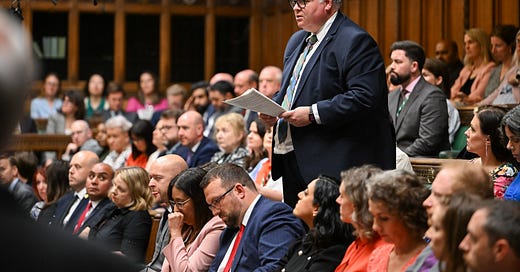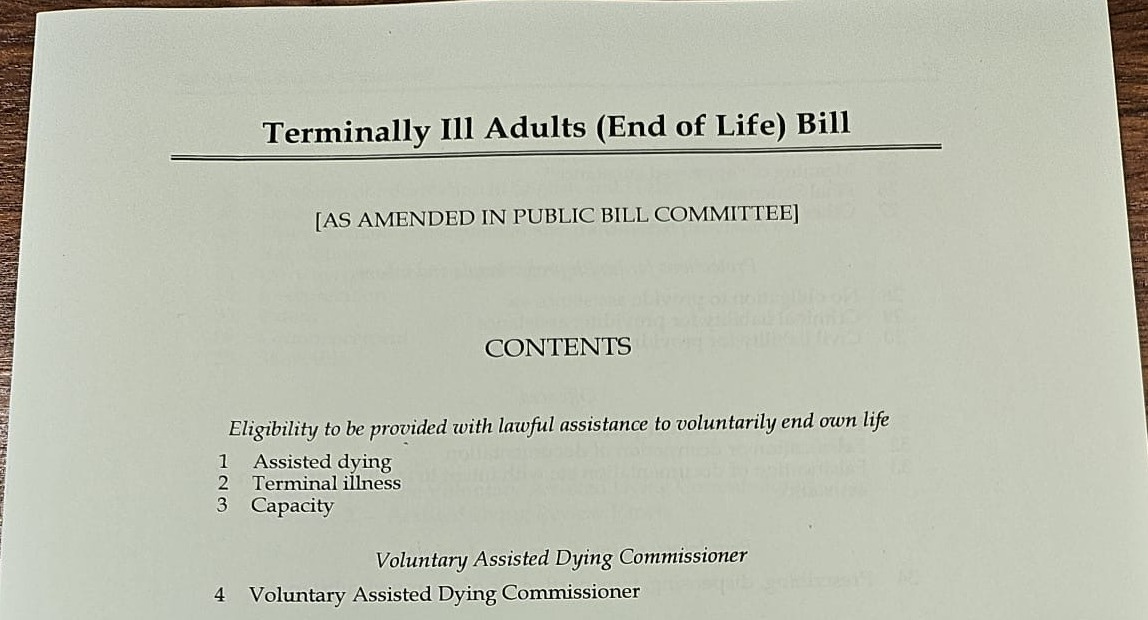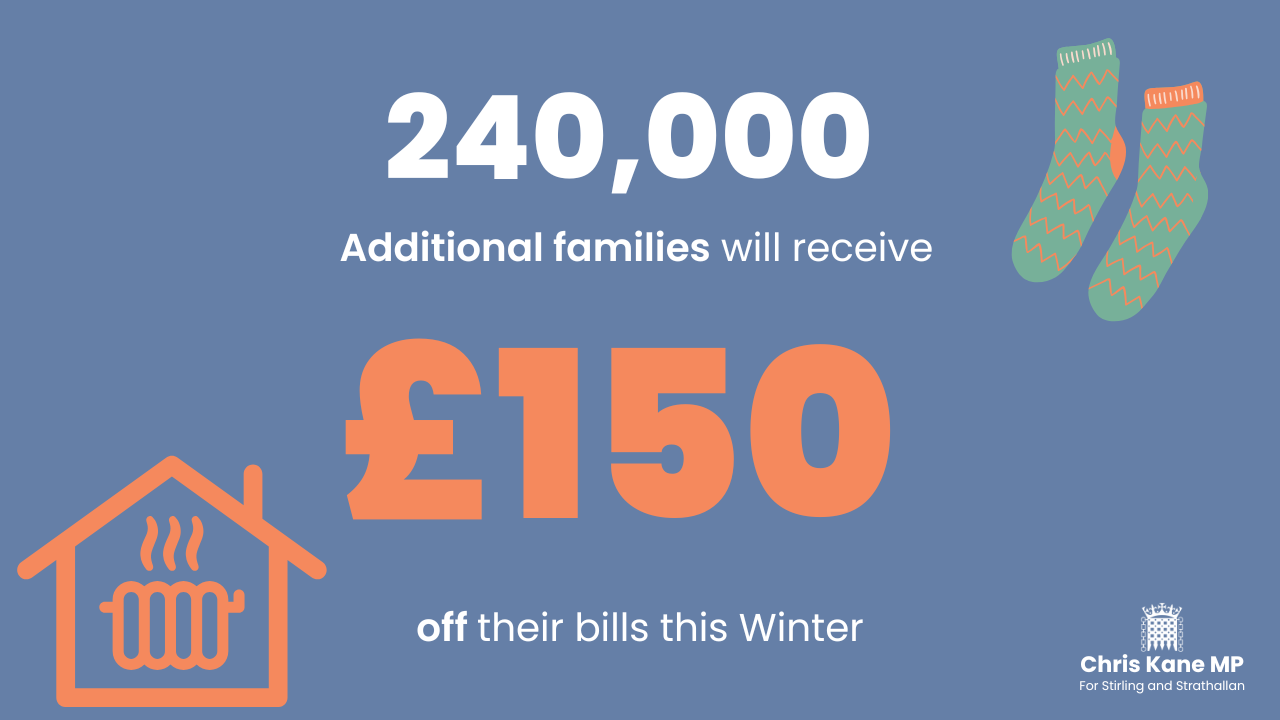Westminster Report - 20th June 2025
A summary of key debates, questions, and decisions shaping the week ahead in Westminster, along with a look back at the previous week's business and my contributions in Parliament.
This week’s newsletter covers a busy period in Westminster and across Government. From major investments in offshore wind and progress on Scottish Investment Zones, to expanded energy bill support and the appointment of the first Windrush Commissioner, there have been several important announcements.
In Parliament, I raised concerns about rural mental health services, temporary housing for children, and support for cadet volunteers, while also speaking on the role of careers education in improving social mobility.
It also includes updates on the Terminally Ill Adults (End of Life) Bill and amendments to abortion law.
I write two regular newsletters: one focused on what’s happening in Parliament and the other covering updates from the constituency, so you can stay informed on the issues that matter both nationally and locally. I hope you find this informative.
Chris Kane, MP for Stirling and Strathallan
Terminally Ill Adults (End of Life) Bill
Today, the Terminally Ill Adults (End of Life) Bill was passed at its third reading in the House of Commons, with 314 votes in favour and 291 against. I voted for the Bill.
I understand that this is a deeply sensitive issue and that there are strong views across society. I also recognise that many will disagree with the decision I made. Please know that I did not take it lightly.
This is not the end of scrutiny for the Bill; it must now go to the House of Lords before it can become law. I will continue to follow its progress closely and will keep you updated as it moves through the next stages.
I will be publishing a full explanation of the reasons behind my decision in the coming days. In the meantime, thank you to everyone who took the time to get in touch with me about this Bill. I’m working to respond to all who contacted me.
While this legislation will only affect England and Wales, I do believe that the debate has played a vital role in framing our national discussion on this issue. As you may know, there is currently similar legislation going through the Scottish Parliament, which may change the law in Scotland. This is currently at stage 2 of its process, and you can track the progress of that Bill here.
Proposed Amendments concerning Abortion Law in England and Wales.
On Tuesday, Parliament debated and voted on proposed amendments to the Criminal Justice Bill relating to abortion law in England and Wales.
New Clause 1 (NC1), tabled by Tonia Antoniazzi MP, was passed by the House of Commons. New Clause 20 (NC20), tabled by Stella Creasy MP, was rejected.
Let me state at the outset that the Criminal Justice Bill does not amend the Abortion Act 1967, which remains the core legislation governing abortion provision. Nor does it change the law in Scotland.
NC1 responds to growing concern about the use of 19th-century legislation to prosecute women who experience pregnancy loss or seek to end a pregnancy themselves. In the last six years alone, more women have been charged under the Offences Against the Person Act 1861 than in the previous 150 years combined.
This change removes the threat of prosecution from women themselves. It does not decriminalise abortion more widely, nor does it shield those who act illegally, coercively, or without consent. Those individuals will still be subject to criminal prosecution.
I understand many constituents have strongly held views on this subject, and I will respond to everyone who has got in touch in the coming days.
This week in Government:
On Monday, the Government confirmed that investment zones in Glasgow City Region and North East Scotland have reached a key milestone, aiming to create thousands of jobs and attract major private investment. The Glasgow zone will focus on advanced manufacturing, including innovation in space, maritime, and semiconductor sectors, with an expected £300 million in private investment and up to 10,000 jobs. North East Scotland’s zone will support green industries and digital technology, contributing to the shift from oil and gas, with around £1.7 billion in investment and up to 18,000 jobs anticipated.
On Tuesday, the Government announced a £1 billion investment in offshore wind supply chains to support jobs in industrial regions, including Scotland. The deal, backed by Great British Energy, The Crown Estate and industry, includes £300 million of public funding to unlock a further £700 million from private partners. The investment will support the manufacture of turbines, floating platforms and port infrastructure, creating thousands of skilled jobs and driving growth in coastal and industrial communities.
On Wednesday, the Government appointed Reverend Clive Foster MBE as the first Windrush Commissioner, delivering on a key manifesto pledge to secure justice for those affected by the Home Office Windrush scandal. The announcement comes ahead of Windrush Day on Sunday, which marks 77 years since the arrival of HMT Empire Windrush. Reverend Foster will serve a three-year term, providing independent oversight of the government’s response and ensuring the voices of victims remain central.
On Thursday, the Government announced an expansion of the Warm Home Discount, meaning over 6 million households will receive £150 off their energy bills this winter. This includes an additional 2.7 million families, with 900,000 more families with children now eligible—among them, 240,000 households in Scotland. The support will go to all billpayers on means-tested benefits, removing previous restrictions and helping 1.8 million households in fuel poverty. Read my full article on the expansion here.
This week in Parliament:


On Monday, I attended the Public Accounts Committee oral evidence session in which the committee examined the challenges faced by the Ministry of Defence (MoD) in governing the body responsible for supporting the UK’s reserve and cadet forces. I particularly examined how the MoD is promoting volunteering opportunities for cadet groups, especially in rural areas in Scotland.
On Tuesday, during Health and Social Care questions, I highlighted the Scottish Government’s continued failure to deliver adequate mental health services, especially in rural areas of Scotland. This is a concern I hear regularly from constituents who feel badly let down. Click here to watch the full question.
On Wednesday, during Prime Minister’s Questions, I raised the fact that over 10,000 children in Scotland are stuck in temporary accommodation, including many in Stirling and Strathallan. I highlighted to Angela Rayner, Deputy Prime Minister, that Scotland is stuck in a housing crisis. Click here to watch the full question.
On Wednesday evening, I attended the Glasgow 2026 Commonwealth Games Celebration event at Dover House. I met with organisers and athletes, including Cerys Finn and Cerys Cairns from the Scottish Netball team, to get the latest updates, as the Commonwealth Games return to Glasgow in 2026.
On Thursday, I spoke in a Westminster Hall debate on the role of careers education in improving social mobility. Improving social mobility is essential to ensuring that everyone, regardless of their background, has the opportunity to fulfil their potential. A strong education system, supported by accessible and well-funded services, is the foundation for that progress. Click here to watch the full speech.
Next Week in Westminster:
Each sitting day begins with MPs questioning a government department. Next week at the despatch box are Ministers from the Department for Work and Pensions (Mon 23), the Foreign, Commonwealth and Development Office (Tue 24), the Department for Science, Innovation and Technology (Wed 25), and the Department for Transport (Thu 26).
Questions to the Prime Minister (PMQs) are on Wednesday at noon.
Constituents are welcome to visit Parliament whenever in London. I am able to apply for a very limited number of tickets each month to watch PMQs from the Public Gallery above the Commons. Visit this page on my website to find out more.
Debates
On Monday, there will be a general debate on Pride Month. In the month of June, we celebrate Pride Month, in which we speak about acceptance, equality and celebrating the work of LGBTQ+ people. It is important that these topics are spoken about in Parliament.
On Tuesday, it is Estimates Day in Parliament. The House of Commons sets aside three 'estimates days' each year on which to consider the estimates of public spending by government departments. Tuesday is the second allotted day. There will be debates on estimates relating to the Department for Education, the Department of Health and Social Care, and the Ministry of Housing, Communities and Local Government.
Wednesday will be the third allotted estimates day. There will be debates on estimates relating to the Ministry of Justice, in so far as it relates to Criminal Justice; the Ministry of Defence, in so far as it relates to the remit of the national armaments director; and the Department for Transport.
On Thursday, the Supply and Appropriation (Main Estimates) (No. 2) Bill will go through Parliament. The Supply and Appropriation Bills give authority for the Government to use the expenditure requested in the estimates and to be issued with money from the Consolidated Fund (the Government’s bank account). This is Parliamentry procedure and follows the two estimates days on Tuesday and Wednesday.
There will also be a General Debate on Armed Forces Day. Armed Forces Day is celebrated on the last Saturday of June every year, and it celebrates all those currently serving in our Armed Forces.
Friday is a non-sitting day; the House next sits on Monday, 30th June.
Ten Minute Rule Bills, Adjournment Debates & Westminster Hall
Backbench MPs can introduce a Bill under the Ten Minute Rule, delivering a short speech to the House. Bills are rarely opposed and are added to the list of Private Members' Bills, but are unlikely to progress further due to time constraints. Adjournment debates take place at the end of each sitting day, allowing MPs to raise issues. An MP applies for a debate, and the Speaker selects one topic. A Minister responds, but no votes are taken. These debates enable MPs to highlight concerns and press for action. Longer adjournment debates also occur in Westminster Hall during the week. Click here to find out what is scheduled for the coming week.
That’s all for this week. From record investment in offshore wind and Scottish jobs to expanded support with energy bills and progress on social justice through the Windrush Commissioner, it’s been a week of significant action. You can stay up to date with my work in Parliament and across the constituency by following me on social media.
Thank you for reading. As always, if there’s anything I can help with, please don’t hesitate to get in touch. Feel free to share this newsletter with anyone who might find it useful.
Until next time,
Chris Kane,
MP for Stirling and Strathallan





